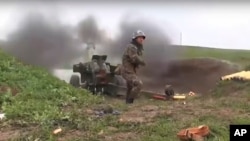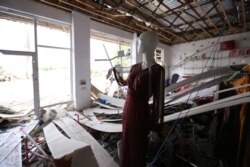Armenia responded positively on Friday to a call by France, Russia and the United States for a cease-fire between its forces and the Azerbaijani forces, which continue to clash over the breakaway region of Nagorno-Karabakh in an ongoing conflict that is threatening to escalate into all-out war.
Armenia is "ready to engage" with the OSCE Minsk Group "to reestablish a cease-fire regime based on the 1994-1995 agreements," the country's Foreign Ministry said in a statement Friday.
Azerbaijan has not yet responded to the call. Both sides had previously dismissed the demands for a truce in the disputed region, where fighting has escalated in recent days to levels not seen since the 1990s.
Azerbaijani forces struck Stepanakert, the main city in Azerbaijan's breakaway region, wounding "many" people on Friday, an Armenian official said as fighting continued for a sixth day.
Warning from France
Meanwhile, French Foreign Minister Jean-Yves Le Drian warned against the risks of an "internationalization" and "out of control" escalation of hostilities between the two countries.
Le Drian called his Azerbaijani and Armenian counterparts and told them that failure to halt the fighting would "bring the risk of an out of control escalation," according to a statement by his office.
In a joint statement as co-chairs of the OSCE Minsk Group, which is tasked with finding a peaceful solution, the French, Russians and Americans called for "an immediate cessation of hostilities" between Armenia and Azerbaijan and for leaders of the two countries to "commit without delay to resuming substantive negotiations."
Russia also has offered to host the Armenian and Azerbaijani foreign ministers for talks to end the fighting that erupted Sunday, reviving a decades-long conflict over the landlocked enclave. The region is within Azerbaijan's borders but is governed by ethnic Armenians and supported by the Armenian government.
Dozens of people have been killed and hundreds of others injured in the fighting, which has since spread to areas outside the enclave's borders.
The conflict intensified on Tuesday as Yerevan claimed a Turkish F-16 fighter jet shot down one of its SU-25 fighter planes in Armenian airspace, killing the pilot.
Turkey and Azerbaijan denied the claims.
Turkey, Russia
Speaking on Russian state television Tuesday, Azerbaijan's President Ilham Aliyev and Armenian Prime Minister Nikol Pashinyan both rejected the possibility of talks, despite urgent appeals to end the violence.
Also this week, the United Nations Security Council called for an immediate halt to the hostilities, as did a spokesman for U.N. Secretary-General Antonio Guterres and the U.S. State Department.
Armenia and Azerbaijan declared martial law and troop mobilizations on Sunday amid fighting over Nagorno-Karabakh.
The enclave seceded from Azerbaijan during the Nagorno-Karabakh War that ended in 1994 but has not been recognized by any country as an independent republic.
A war between the two former Soviet republics could also involve regional powers Turkey and Russia, which has a defense agreement with Armenia. The Turkish government supports its own ethnic Turkic kin in Azerbaijan. Moscow is a vital supporter of Yerevan and maintains a military base in Armenia.







